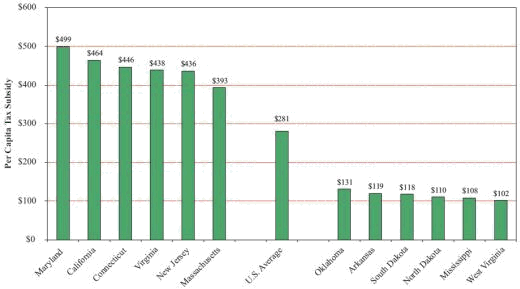Mortgage Interest Deduction Favors Blue States
The home mortgage interest deduction benefits Democrat-voting states most! Is the fix in?
Paul Caron links and analyzes a study by Marty Sullivan showing that the mortgage interest deduction “heavily favors blue states.”
The benefits of the mortgage interest deduction are not evenly distributed among the states. … [T]he per capita tax benefit from the mortgage interest deduction for Californians is more than two and a half times that for Texans. Marylanders get nearly five times the benefit of citizens in neighboring West Virginia.
We always knew the mortgage interest deduction was unfair — favoring those in high tax brackets with big houses over renters and low-income homeowners. But until we did the calculations — as far as we know, the first of their kind — we did not suspect the geographic dispersion of tax benefits would be so large. …
In addition to the wide disparity in benefits, the other striking feature about the mortgage interest deduction is how well the subsidy correlates with Democratic strength. … [The fourteen] states with the highest per capita benefit were states captured by Obama in the 2008 election [Maryland, District of Columbia, California, Connecticut, Virginia, New Jersey, Massachusetts, Colorado, Washington, Nevada, Hawaii, New Hampshire, Minnesota, Delaware]. In the six states with the lowest per capita benefits [West Virginia, Mississippi, North Dakota, South Dakota, Arkansas, Oklahoma], Republican challenger John McCain won the vote. … Obama won the popular vote in 22 out of the top 26 jurisdictions, compared with 8 out of the 25 states with the lowest per capita benefits.
This is implying causation when none exists. Housing prices are highest in a handful of metropolitan areas and those have long voted Democratic. But it’s absurd to imply that the mortgage interest deduction was somehow a way to buy votes for Dems.
Regardless, it’s doubtless true that some parts of the tax code — the mortgage interest deduction and the write-off for state and local taxes — disproportionately benefits the Blue states. Or, again, actually just the huge population centers within them. (Maryland and Virginia, for example, aren’t particularly expensive — aside from the parts within commuting distance of Washington, DC.) Then again, other parts of the tax code — notably the massive subsidies for agriculture — disproportionately benefit Red states.
And, of course, studies repeatedly show that the net effect of federal spending results in a quite substantial net transfer of wealth from Blue states to Red. That’s not exactly shocking: To the extent that we use the tax code and the budget to redistribute wealth, we do it from richest to poorest. And the Red states are generally poorest.
via Glenn Reynolds







Oh, fiddle-dee-dee. Cities, people, cities. Housing prices are higher in big cities by a considerable amount, higher housing prices mean bigger mortgages. States with big cities also tend to vote Democratic.
(I think I said that!)
Frankly, as a I foreigner, I´ve NEVER understood the Mortgage Interest Deduction. In Brazil Healthcare and education expenese are deductible, but Mortgage Interest makes no sense. It´s more bizarre than Medicare.
I’m supporting you, James, not disagreeing with you.
Andre, it’s simple: Healthcare and education are less desirable than home ownership.
Andre: As a homeowner who benefits nicely from the deduction, I concur. I get incentivizing home ownership, which tends to bolster one’s stake in the community, but it’s a transfer of wealth from the poor to the rich.
Dave: Ah. Hard to tell on the Internets!
tom p: Well, we do pay for those things through tax money — much more of it than goes to the mortgage deduction.
“Well, we do pay for those things through tax money — much more of it than goes to the mortgage deduction.”
That´s pretty more socialistic than in Brazil. Specially considering that there is few options in Public Health care in the US if you are younger than 65 years.
As a home owner who has never benefited from the deduction, I have only seen it as an incentive to encourage debt, A strange Idea at best but not unexpected, considering the source! [lol]
The benefits of the mortgage interest deduction are not evenly distributed among the states.
But aren’t they evenly distributed among the homeowners, The deduction is not progressive.
Maybe “homeowners” should have read… “Mortgagees”
My understanding is that landlords can deduct their interest payments on their property as a business expense.
If so, then the mortgage interest deduction can be seen as a measure to level the playing field between renting and owning. Note that this interpretation is precisely the opposite of the way most people think about the situation.
If we eliminate the deduction for credit card interest no one will ever use credit cards!
If we eliminate the deduction for interest on auto loans no one will ever buy a car!
We’ve been over this time and time again over the past 4 decades and none of those predictions panned out.
In a time of fiscal disaster perhaps we should ignore those who will yet again warn of pending doom and just eliminate the mortgage interest deduction. I suppose it would cost me a little but I can live with that so long as we kept the ability to not pay gains on the sale of a home when a new one is purchased.
But seriously, could we do that and still allow money managers to pay 15% on income derived from income on managing other peoples money?
Instacracker fails to mention the high income Blue Staters subsidize their lackadaisical Red State via much higher income taxes.
New York state pays enough excess income tax to subsidize the entire Confederacy these days.
But isn’t that a small price to pay to keep the residents of Alabama in Alabama?
I guess it all goes back to the fact that red staters really hate the government that feeds them.
Who could have guessed they would be so easily manipulated?
“My understanding is that landlords can deduct their interest payments on their property as a business expense.
“If so, then the mortgage interest deduction can be seen as a measure to level the playing field between renting and owning.”
Wouldn’t that be the case only if the landlord passes the fruits of the deduction onto his renters in the form of lower rent, right? Somehow, I don’t see this happening all that often. Some states, eg. Massachusetts, allow renters to deduct 50% of their rent (up to some maximum) as a way of addressing this.
You can tell the fix is in if no one proposes a 10 year fade-out.
“I guess it all goes back to the fact that red staters really hate the government that feeds them.”
Indeed, Dave.
From CNN today:
“Texas, which crafts a budget every two years, was facing a $6.6 billion shortfall for its 2010-2011 fiscal years. It plugged nearly all of that deficit with $6.4 billion in Recovery Act money, allowing it to leave its $9.1 billion rainy day fund untouched.”
“Even as Perry requested the Recovery Act money, he railed against it. On the very same day he asked for the funds, he set up a petition titled “No Government Bailouts.””
http://money.cnn.com/2011/01/23/news/economy/texas_perry_budget_stimulus/?cnn=yes
Instacracker and the other wingnut frauds are truly terrible human beings.
James Joyner says:
Monday, January 24, 2011 at 13:47
Andre: As a homeowner who benefits nicely from the deduction, I concur. I get incentivizing home ownership, which tends to bolster one’s stake in the community, but it’s a transfer of wealth from the poor to the rich.
Allowing someone to keep more of their own income, is not a “transfer” at all , as it was theirs to begin with.The poor pay no taxes anyway.
IP727: The poor pay all manner of taxes; they just tend not to pay Federal income taxes.
I agree that letting people keep their money isn’t usually a subsidy. Here, though, it’s a kickback of money from the Federal government. People at a given economic bracket owe X. But people who do things that the government is subsidizing owe X – the deduction. That’s a subsidy for the activity in question.
>>>tom p: Well, we do pay for those things through tax money — much more of it than goes to the mortgage deduction.<<<
Sarcasm JJ, sarcasm. Doesn't always come thru on the printed word….
>>>>That´s pretty more socialistic than in Brazil. Specially considering that there is few options in Public Health care in the US if you are younger than 65 years.<<<<
Andre: NO. In America it is only "socialistic" if you are transferring money from the rich to the poor. (ie mortgage tax deductions)
It is CAPATALISTIC if you are transferring wealth from the poor to the rich…. (do I have to iterate?)
In short, one is good, one is bad… I'll bet $100 you can figure out which is which.
IP727: The poor pay all manner of taxes; they just tend not to pay Federal income taxes.
The federal mortgage deduction was the issue of this post.
The state and local taxes that the “poor” may pay has no bearing on federal deductions.
It is newthink/doublespeak to suggest that allowing one to keep the fruits
of one’s own labor, is somehow a “kickback”. That would imply that the gubmint
owns everything to begin with.
A specious argument
tom p says:
Monday, January 24, 2011 at 17:52
Andre: NO. In America it is only “socialistic” if you are transferring money from the rich to the poor. (ie mortgage tax deductions)
It is CAPATALISTIC if you are transferring wealth from the poor to the rich…. (do I have to iterate?
Great sophistry, but lacking in fact. The “poor” have no wealth to transfer.
Redistribution of wealth whatever direction is socialistic,allowing one to keep the fruits of their own labor is capitalistic.
It´s not a matter of allowing people to keep their money, it´s a matter of incentives. Besides that, allowing deductions for one thing but not to another creates a distortion. Frankly, I don´t understand why people should be allowed to deduct the interest rate of the mortgage but not healthcare or education expenses.
Andre: I’m not an expert in the US tax code, which constantly changes, but there are deductions for healthcare and education expenses. But healthcare has to exceed a certain percentage of income to qualify and there are rules on when/what education expenses count.
I was going to write a comment mentioning that perhaps this is a slight finger on the scale to help out the Blue States whose pay tends to put them in higher tax brackets for similar standards-of-living in red states… but Ponce kind of killed the mood. So insert something here about how people that disagree with me on political issues and have different priorities are bad people. Self-righteous disgust is gratifying.
BTW, that robo-signing thing has been smoldering in the background.
This is fairly big news: Bank Of America Dives, As Foreclosure Freeze Is Worse Than Thought